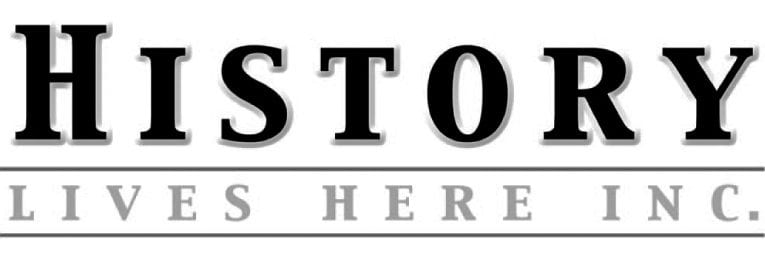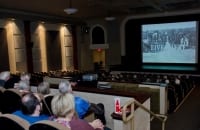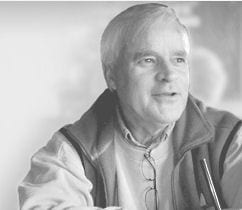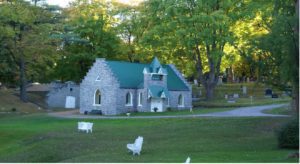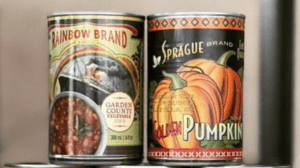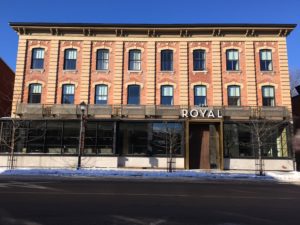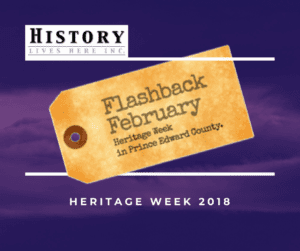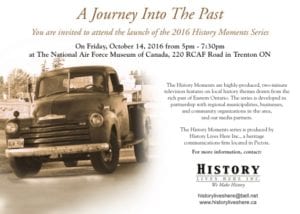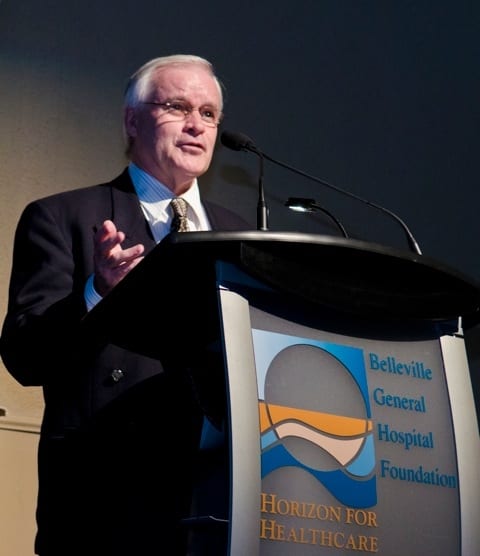
Thank you for sharing this special evening with us.
What we’re going to do tonight is show you 12 wonderful stories from the rich past of the Quinte area.
We might have shown you several thousand stories tonight because that’s how many there are. In fact there are so many, we will never ever run out of history.
But we thought that might make for a long evening, so we’re just going to show you 12. But the idea is that we will be back again next year at this time with another 12, and another 12 the year after that. And the series will continue indefinitely.
Why are we doing this?
One reason is that this is the 90th anniverary of the Belleville Kiwanis Club. I can’t think of a better birthday present than to share the history of the community with the community.
But there are other reasons.
One is the battle going on in communities all across the country and it is a battle that communities are losing…badly. This is the battle for heritage preservation.
In my hometown of Picton we lost an 1875 church on our Main street two years ago this month. It’s demolition followed the demolition of an entire nearby block six months before that. Today if you visit Picton you will see two weedy vacant lots where those buildings once stood.
I think we made a very poor trade.
Heritage buildings are a phsyical expression of our past.
And if you tear down all the special places in your community, you have to wonder what’s so special about your community? The sad answer to that is “absolutely nothing”. This is a squandered inheritance.
Heritage isn’t free. It’s come at an enormous cost to those who have gone before us. I think we owe them something.
We should remember them always. We should tell their stories…and we should be stewards in our time of the legacy they left us. That’s why it matters.
What if history and heritage made money?
If they did, we could partner with property owners and developers contributing dollars to projects, which preserved – rather than tore down – heritage properties.
The loss of heritage buildings is only going to get worse over the next 10-15 years as our volunteer organizations age.
Volunteers help maintain many old properties – cemeteries, archives, libraries and museums. But many volunteer community groups are aging. I could name you a dozen organizations in Prince Edward county on the verge of folding.
So the volunteer base is aging and at the same time, grants and funding for these organizations is declining.
Governments at all levels should be interested in this question because they are not possibly ever going to make up the difference in money and human capital to replace the millions of dollars and volunteer hours committed every year to a wide range of worthy causes….
Queen’s University released a study of the non-profit sector recentl and one of the stats in the study was that 7% of volunteers do 71% of the work, so you can see how vulnerable the sector is if just 7% of its members retire from volunteering.
And when they do, the churches and other heritage properties they now help to maintain are going to face an uncertain future.
So the big question is “What’s going to happen when you and I can’t do this work anymore?”
What if history and heritage made money? If they did, we could hire staff rather than recruit volunteers to do this work.
Young people don’t need a history lesson. They need jobs. And the truth is a young, skilled, competent professional working a 40-hour work week will out perform a volunteer borad. Volunteers give what they can. But it isn’t always enough.
There is a huge marketplace for history.
Every month, 68 million people around the world google the word history. They’re looking for history and we have it. And we have the means through new technologies to reach them.
History is one of the top three reasons why people travel after family and friends people.
The history channels in the U.S. and Canada exist because they link advertisers with 9.8 million Baby Boomers in Canada…. And their parents…who buy stuff…and lots of it.
We have the business case of Ancestry.com – the online geneaology site with 1.7 million subscribers paying an average of $16.75 per month to access their records. That’s $28 million/month to look through old records of marriages, births and deaths. What do we have in our municipal archives, libraries, museums and cemeteries? We have old records.
Finally, we have the business model of Gettysburg, PA., which has turned its history forged during the 1860s during the American Civil War when 50,000 soldiers from both sides died in three days of fighting into a heritage economy – the concept that local history can be transformed into a suite of goods and services retailed to the world.
They make $385 million/year from the 3 million people who visit them each year. They’ve created 5,800 jobs and a tax base of $109 million. Now I ask you –”what could be simpler than to tell the same three days of history every year and make that kind of money?”
We have more than three days of history. We have 228 years of loyalist settlement. So why don’t we tell our stories to the world and develop a heritage economy? Why don’t we make money from our history?
If history made money, we wouldn’t tear down old landmark buildings. We’d value them as an important part of our past.
If history made money, we wouldn’t consider our archives, museums, libraries and cemeteries as municipal loss leaders and heritage beggars. We’d view them as profit centres and history factories.
If history made money, we would create jobs for young people in the history business rather than recruit an older generation as volunteers.
And if history could make money, it would answer the question –”What’s going to happen when we can’t do this work anymore?”
The answer is for us to be in the history business.
It’s not often you get to make history. But you and I are making history tonight because we are introducing our first product in the heritage economy – the 2012 History Moments series.
History has to be more than a vague cultural thing. It has to be something you can eat, something you can drink, something you can experience. This series is something you can hold in your hand…something you can experience.
So, the History Moments are just a first product because history can be a bus tour, a festival, a toy, a craft, a play, a specialty food or drink. But as a first step we need to awaken the community to the rich history that is all around is and the enormous economic possibilities if we retailed our stories to the world.
There are new audiences for these old stories. We can create a new industry from an old asset. And that’s why the past matters.
I would like to thank the Kiwanis club for allowing us to be part of their 90th anniversary celebrations.
And also to thank our sponsors – the Black Prince winery, The Belleville Intelligencer, the City of Belleville, the Corporation of the County of Prince Edward County, Essroc Cement, the Inrig family, LaFarge North America, and our community partners – the Community Archives of Belleville and Hastings County, the Hastings County Historical Society, the Museums of PEC, the Glenwood Cemetery, and TV Cogeco.
Finally I’d like to thank all the people who assisted in the making of the series. I don’t do this work alone so know when you watch these stories, you are watching the work of many highly-talented people.
We hope you will join us for a glass of Black Prince wine and a reception after the showing.
Here now is the 2012 History Moments Series.
